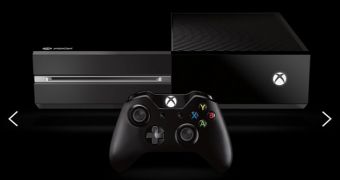Microsoft has shot down the rumor regarding the alleged price cut that the Xbox One computer entertainment system is about to get, stating that the Kinect-free SKU is the only markdown that the device will get for now.
In spite of the fact that its main competitor, Sony's PlayStation 4, is outselling the Xbox One by a rather large margin, Microsoft says that it doesn't have any additional plans to further cut down the price of its console in order to drive up sales.
The rumors regarding an upcoming price cut for the Xbox One were sparked by an image found on the Microsoft Spain website, showing the Kinect-less version of the console with a price tag of €350 / $468, which would translate into a €50 / $67 reduction in price over what the device is currently going for.
Microsoft later confirmed that the price listing was due to an error, to an employee entering the wrong price for the new Kinect-less SKU.
The roles seem to be reversed now, since last time around, it was the PlayStation 3 that was sold at a much higher price, and thus led to the Xbox 360 noticing a considerable increase in sales in its early days.
Microsoft has already cut the price of the Xbox One considerably, by removing the voice and motion sensor that it touted as indispensable for the proper Xbox experience, and the substantial reduction in price, although not actually a cut per se, still caused the device's sales to double month-over-month in June, when it was first introduced.
Microsoft however has a little breathing room to enable an actual price cut on the console, as by its own account it was making a profit on the Xbox One + Kinect package since day one, which means (considering the Kinect 2.0's standalone price) that the version free of the sensor is also profitable on its own.
Microsoft's decision to stick to a more cautious pricing scheme for now, in spite of the very poor sales (by comparison), is likely indicative of the company trusting its future efforts to turn the tide against Sony's console, or at least put its own hardware on an equal footing, without needing to resort to selling it at a loss in order to recoup.
It's also very early in the new consoles' life cycle, and although analysts claim that we'll see a much shorter span than the previous 8-year-long interval between this generation and the next, there is still a lot of room for both companies to evolve, and for Microsoft to catch up to Sony, in spite of the fact that the Japanese corporation is so far outselling the Xbox by as much as a 3:1 ratio.

 14 DAY TRIAL //
14 DAY TRIAL //